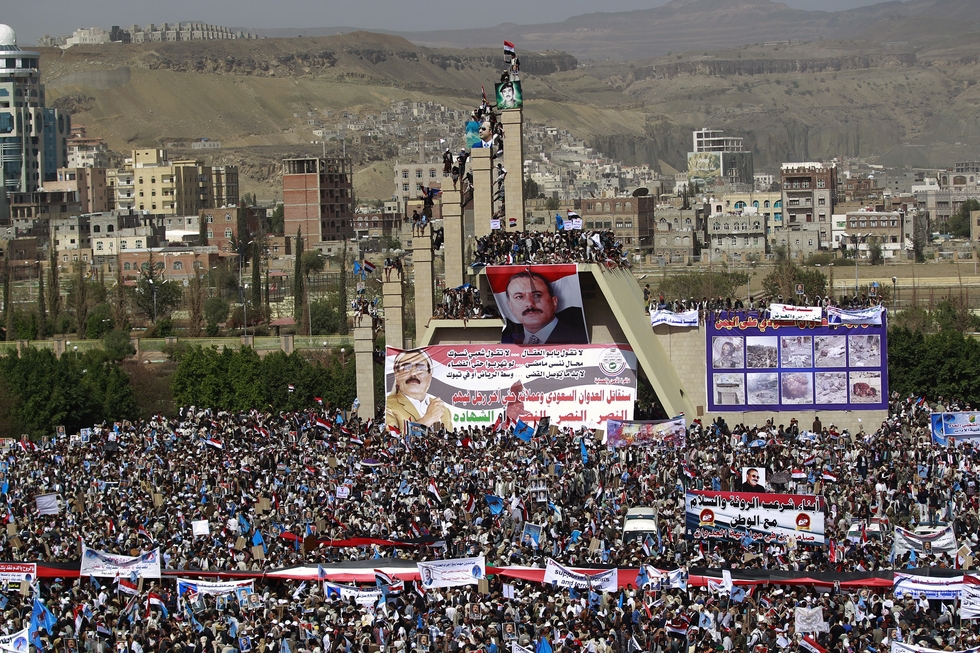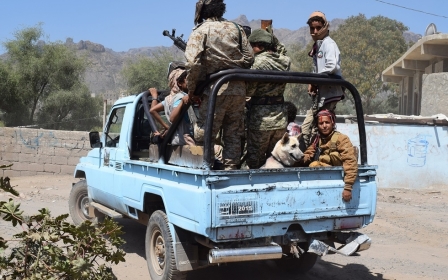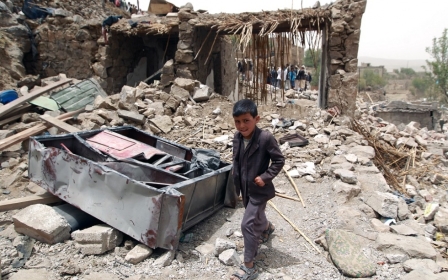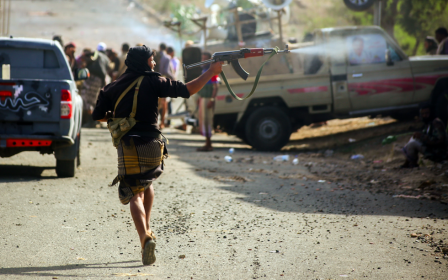Mass Sanaa protest marks year of Saudi role in Yemen war

Huge crowds massed in Yemen's rebel-held capital Sanaa on Saturday as thousands of Yemenis marked a year to the day since Saudi Arabia began a bombing campaign in support of the the impoverished country's government.
The intervention in support of President Abd Rabbuh Mansour Hadi began on 26 March last year, but has yet to deal a decisive blow to the Houthi rebels and their allies, who still control Sanaa and key parts of the country.
"Together against the tyrannical Saudi aggression," said a large banner in Sanaa's Sabaeen Square where protesters gathered.
Warplanes from the coalition flew at low altitudes over the massed protest, breaking the sound barrier in an apparent show of force.
Deposed president Ali Abdullah Saleh, who was brought down by popular Arab Spring-style protests beginning in 2011, appeared at the rally surrounded by crowds of supporters.
During a brief speech, the first he has given publicly since the bombing aimed at him and his Houthi allies began, Saleh reportedly called for direct negotiations with Saudi Arabia.
Posters bearing Saleh's image were said to be plastered over the city's walls on Saturday, with pro-Saleh banners held aloft during the demonstration.
The Houthis have called for another protest later in north Sanaa.
Rebel chief Abdulmalik al-Houthi addressed his supporters in a defiant televised speech on Friday.
"One year on, we look at the outcome of this aggression ... It was said to be aimed at helping and serving the Yemeni people. [But] this help came in the form of criminal killings and genocide," he said.
"The aggression and those criminal aggressors have only caused huge damage at all levels in our country and in the rest of the region," he said, in an apparent reference to increased tension between regional rivals Saudi Arabia and Iran.
The Houthis seized Sanaa in September 2014 and advanced southwards, raising fears in Riyadh that the Shia rebels from Yemen's highlands would extend Iranian influence in Saudi Arabia’s southern neighbour.
Riyadh and its Sunni Arab allies vowed to restore Hadi's government to power after he was forced to flee into exile in March last year.
Loyalists backed by the coalition have since managed to drive the rebels out of five southern provinces including second city Aden, where Hadi has established a temporary capital.
The rebels have held on to eight of Yemen's 22 provinces, including the capital, and heavy fighting has been raging for months in five others.
Amidst the chaos, the Islamic State group and al-Qaeda have grown their support in the south and have carried out deadly attacks, mostly against forces loyal to Hadi.
On Friday, IS claimed suicide bombings that targeted checkpoints of loyalist forces in Aden, killing at least 22 people, including 10 civilians, a security official said.
Around 6,300 people have been killed in the conflict since the coalition launched its campaign, more than half of them civilians, according to the UN.
Yemen, already the poorest country in the region, has been pushed further into destitution, with thousands of people reckoned to be on the verge of starvation.
International rights groups have repeatedly criticised the coalition for civilian deaths, and have urged the United States and other world powers to stop selling arms to Saudi Arabia.
Washington, a key ally of Riyadh and its biggest arms supplier, has expressed concerns over the loss of civilian lives.
Hopes for a breakthrough in the conflict emerged on Wednesday when UN envoy Ismail Ould Cheikh Ahmed said warring sides had agreed on a ceasefire to be observed before peace talks scheduled for 18 April.
Previous negotiations have failed and ceasefires, of which there have been several, have not been respected.
New MEE newsletter: Jerusalem Dispatch
Sign up to get the latest insights and analysis on Israel-Palestine, alongside Turkey Unpacked and other MEE newsletters
Middle East Eye delivers independent and unrivalled coverage and analysis of the Middle East, North Africa and beyond. To learn more about republishing this content and the associated fees, please fill out this form. More about MEE can be found here.




